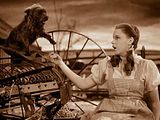Feminists
In reply to the discussion: What would a Feminist Society look like? [View all]Zorra
(27,670 posts)The author of this piece knows a great deal more than I do about Juchitan, and I would say that her perception is accurate, from my POV gleaned from within the limited boundaries of my time and experiences in the town, and with the culture. I've been to Juchitan several times, my longest stay was about two weeks. It's obviously very unique. I posted this essay and the following article here to illustrate, to some extent, what an actual existing functioning matriarchy with long historical roots looks like.
Is the society of Juchitan a feminist society? From my perspective, I feel that it is.
"The economy remains embedded in the societal and cultural context in the form of the so-called prestige economy. The person with the highest esteem is not the one who owns most, but the one who gives most." (: - (from the article)
snip--
Juchitán, the town of women
The women of Juchitán, of the Isthmus of Tehuantepec, are famous throughout the nation of Mexico because of their beauty and their economic power. Something of this power could be felt in the recent film about the world famous painter Frida Kahlo, who had her Mexican roots in this area. In this country whose character is stamped by "Machismo", the Latino male superiority, one often hears it said "Juchitán is run by women's rule." In Mexico a man is teasingly called a "Teco" (derived from Juchiteco) when he displays supposedly un-masculine softness in the dispute between the sexes. "Teca" is the name for a woman who is proud and energetic and able to prevail. This reflects the ethnic character of women in Juchitán quite well.
The town of Juchitán is a regional trade centre. Moreover it is the residence of farmers and fishermen. Two large saltwater lagoons, rich in fish, are situated 5-10 km away from the town. The surrounding coastal plain is dedicated to tillage and animal husbandry. To visualise the character of this town, we can think of the European agricultural towns, made up mainly of town farmers who owned farms situated within the town's district which were still widespread up until the 1970's and are still in existence today.
Trade in Juchitán is exclusively in the hands of women. Each woman perceives herself as a trader, this skill is essentially given to her "in the cradle", by virtue of being a woman and a Teca. Even as a teacher or physician she will still trade in some goods, for example with gold jewellery or with medical equipment. This trade is both local and regional – Juchitán traders have outposts in the surrounding areas and with other ethnic groups – as well as doing long distant trade to Central America and to the southern states of the US. The main trading goods for long distance trade are local specialities, like dried shrimps, toasted tortillas called totopo, gold jewellery and richly embroidered garments. Agriculture and fishing are men's domains exclusively. A wife of a farmer does not see herself as a peasant woman, but as a trader of agricultural products, likewise, the companion of a fisherman. The men deliver their produce and catch to the women who process them to corn pies or cheese, to delicious chicken dishes or smoked fish, which they then sell on at the market. Or they act as brokers and sell the raw products to other women who in turn process them. Similarly trade in handcrafted products is women's domain.
There is quite a rigid division of labour in Juchitán along the line of the two basic sexes of women and men. Labour defines the sex to a great degree. One could almost get the impression that the rigidity in the sexual division of labour serves mainly the definition of further sexual identities and not so much that of man and woman. The mushes, mostly homosexual men who define themselves as women, do women's work and refuse to do men's work, thus defining their sexual identity through their work. It is similar with the marimachas, women who live with other women and take the male part in the relationship. The sexual practices themselves are rather secondary in view of the social sex assignment. The sexual partner of a mushe is not seen as a mushe, or as homosexual, but simply as a man. The same holds for the partner of a marimacha. If same sex partners do not assign themselves through their work as - biologically antidromic – a third or fourth sex, then sexual contact is rather sporadic and is not an issue in the wider society. What we call bi-sexuality has a very high occurrence in Juchitán.
"We men do not feel oppressed," says Gaspar Cabrera, the town priest, who is from a nearby village. "This is simply a more egalitarian reality. In this aspect, Zapotec culture is more advanced, and European culture is catching up."
"Toto.....I have a feeling we're not in Kansas anymore...
